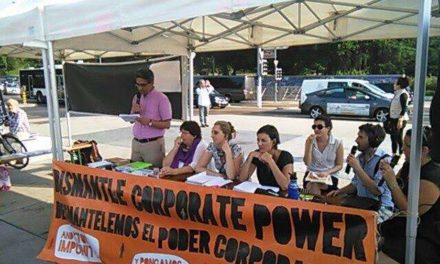Text and photo by Joseph Purugganan
The intergovernmental working group (IGWG) mandated under the UN Human Rights Council Resolution 26/9 to spearhead the elaboration of a legally binding instrument on TNCs and human rights made initial strides yesterday with the unanimous election of Ambassador Maria Fernanda Espinosa of Ecuador as chairperson of the IGWG, and the adoption of the program of work for the first session of the open ended intergovernmental working group.
Earlier in the day, the European Union raised two main issues that caused delay in the adoption of the proposed program of work. The first issue was over the agenda with the EU proposing to include another panel to discuss the implementation of the UN Guiding Principles on Business and Human Rights. Secondly, the EU asked for a change in the title of the concept note prepared by the Chair to guide the sessions to include ‘ALL’ business enterprises, thereby expanding the scope of the work beyond transnational corporations.
After almost a four-hour recess, the sessions resumed around 3:45 in the afternoon with Chair Espinosa reporting on the results of the consultations and presenting these results “in the interest of transparency and flexibility.”
On the proposal to include a panel on the UNGP, the Chair said “listening to voices within the chamber that these Guiding Principles was a point of reference but showing flexibility we have accepted the introduction of this initial panel.” She then welcomed Michael Addo, the Chair of the Working Group on Business and Human Rights, as the panelist for this initial panel.
On the second proposal to broaden the scope of the work to cover all other business enterprises. The Chair reported that the “point was broadly discussed, but that this proposal did not have the support of the majority, therefore I propose from the seat of Chair that we proceed with adoption of program of work. With addition of first panel, but keeping the rest as is.” The Chair then opened the floor to interventions to get a signal from the room on her proposed course of action.
The EU was the first to speak. The delegation thanked the Chair for her for efforts to find a solution on programme of work to start the discussion without further delay sensing “a great degree of impatience from the room especially from CSOs.” It then expressed appreciation over the inclusion of an additional panel on GP on renewed commitment from all States. The EU then articulated an amendment to its second proposal, dropping its insistence on changing the title of the Resolution (26/9) as adopted but shared a new proposal that according to the EU was not its own but one that was tested during the lunch break for the inclusion of a footnote that reads: “This programme of work does not limit the work, taking in to consideration the work on TNC s and ALL other business enterprises.”
While the first proposal to include an additional panel on UNGP generated brod support, the second proposal expressed by the EU was rejected by the majority of the States that expressed their positions. Pakistan, India, the Philippines, Indonesia, Cuba, China, Bolivia, Venezuela and Ecuador were all categorical in their rejection of the inclusion of the footnote saying the proposed footnote is “in direct contravention to the UNHR Resolution 26/9.”
Other countries like Chile, Uruguay, Algeria on the other hand expressed a need for further consultations but hoping to find a procedural way out to include in the discussions the proposal on the footnote and the inclusion of these discussion in the report.
Mexico was the only other country that expressed support for the EU’s second proposal.
After hearing the views of the member States. The Chair decided to adopt the program of work with the inclusion of the first panel on UNGP in the agenda.
The first two panels were completed yesterday. Panel 1 on UNGP featured the intervention of Michael Addo, Chair of the Working Group on BHR. Mr. Addo stressed and affirmed the connection of the two bodies (on the binding treaty and BHR) for effective mechanisms to address issues around business and human rights, and reiterated the view that “renewed commitment to strengthen international standards should be complementary to UNGP which he described as most authoritative (mechanism in place) with its three pillar standards.”
He then outlined for him the key lessons that the IGWG on the binding treaty can draw from the experience of the working group on BHR: (1) the process is as important as substance. should be inclusive , consensual and provide a bedrock beyond Ecosoc approved NGOs; (2.) We have enough legal framework. We need to affirm existing law and not create new standards; (3) Think of victims expecting real outcomes and consider the position of victims and how best to implement UNGP; and (4) Continuing process of effective means of implementation of UNGP.
For the second panel we heard the views of international legal experts on the principles and elements of a legally binding instrument on TNCs and HR.
Dr. Chip Pitts of Stanford University Law School shared 10 principles for an effective legally binding instrument:
1. Should be progressive not regressive. It should build on and be consistent w in progressive development with GP. to make soft law norms as hard as they can be. Progress should address the need for national action plans.
2. Process must be fact based and evidenced based. Recognize that most victims remain without remedies. Aside from formal there are practical burdens that need to be addressed.
3. Work must be realistic and feasible for all stakeholders. Suppliers must be part of the process. Process must be creative and innovative.
4. Goal should include capacity building– educating lawyers and business to contribute to internal behavioural change.
5. Should be ambitious. Realistic but stretched goal. Harmonizing at high level currently convergent norms in this area.
6. Process must reinforce the universal nature of the rights. Cannot be selective.
7.Practical value of these rights. These are not mere moral aspirations also in jurisprudence and laws
8.Transparent and inclusive process.Ideas can come from everywhere
9.Leadership challenge for all of us. The good governance in BHR and CSR are principles that are also leaderhsip principles
10.Results oriented for victims. Keeping them in mind. Practical monitoring and oversight to remove barrierrs to effective remedies.
There was generally strong support from the panelists for the trailblazing work of the IGWG and the necessity of finding ways to move the work forward to address the tremendous challenges.
The session will resume today at 10am with a whole day panel (Panel 3) on Scope with discussion on the coverage of the instrument, concepts and legal nature international law; and a discussion on human rights to be covered under the instrument with respect to activities on TNCs and other business enterprises.








